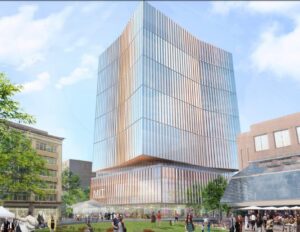
Boeing is offering more than half of the space that it originally leased at 314 Main St. in Cambridge for a new autonomous vehicle research center. Image courtesy of Weiss/Manfredi
It’s far from the best time to list office space for sublease, as most companies hold off on real estate decision-making while trying to gauge their short-term prospects and the economy’s trajectory.
That hasn’t stopped Greater Boston businesses from seeking to shrink their footprints in recent weeks. Local commercial real estate researchers are tracking nearly 500,000 square feet of sublease space that’s hit the market since mid-March.
“During this recession, no industry is really immune to job losses,” said Todd Galvin, a market analyst for commercial real estate researchers CoStar. “Throughout the entire economy, not one sector in Boston has been resilient.”
Greater Boston’s office market faces a potential confluence of headwinds: uncertainties about the future of office work, a hazy outlook for economic recovery and a sizeable construction pipeline including speculative office projects such as 812,000 square feet at Millennium Partners’ Winthrop Center skyscraper.
Brokers and researchers say the office market fundamentals had been the strongest in decades prior to the health crisis, providing a cushion against sudden givebacks. The downtown Boston vacancy rate remained below 9 percent in the first quarter, according to numerous industry reports, while the office and lab market in Cambridge has been one of the nation’s tightest for much of the previous decade.
The economic shocks since March have changed the equation. Some companies are already offering excess space in buildings still under construction. Boeing, for example, has listed over half of the 100,000 square feet it leased in 2018 at Massachusetts Institute of Technology’s 314 Main St. for a new aerospace and autonomous vehicle center. Ad agency Mullen Lowe is offering a quarter of the 115,000 square feet at its future headquarters at 2 Drydock Ave. in the Seaport District.
They join several significant offerings on the market prior to the pandemic, including 211,000 square feet by State Street Corp. at 100 Summer St. in Boston and 200,000 square feet by Wayfair at 10 St. James Place in Back Bay.
And several more major blocks of space are expected to be listed by the end of the second quarter, according to commercial brokerage sources, following big layoffs at companies such as Sage Therapeutics and restaurant tech platform Toast.
A Contrast to Previous Downturns
Even more space might have been listed already if building tours hadn’t been decimated by COVID-19 distancing, said Aaron Jodka, managing director of research at Colliers International in Boston. And the sudden onset of the pandemic was a contrast from previous economic downturns.
“No one saw this coming, so we weren’t seeing businesses going through a normal economic cycle in which you could scale back your growth,” Jodka said.
In a recovery however, Jodka noted, companies may find more willing takers for gently-used office space. Coworking providers and landlords that have built out “spec suites” for fast-growing tech companies that want to move in quickly have set a new standard.
“The spaces that are fully-furnished and ready to go will be in high demand as companies figure out their short-term plans, especially the groups coming out of coworking,” Jodka said. “Their only experience with offices is everything is provided to them, so having that fully-furnished option is intriguing.”
But the coworking sector also plays a part as a potential drag on a market recovery, with most of the major players pausing expansions. That’s significant because coworking companies accounted or 20 percent of Boston’s office absorption in 2019, said Mark Hickey, director of analytics for CoStar.
CoStar is tracking 467,130 square feet of sublease space added in Greater Boston since April 1, a nearly 10 percent increase overall. At 5.3 million square feet total, the sublease market is the largest it’s been since 2010.
By comparison, during the last economic crisis, Greater Boston sublet space increased 36 percent between late 2008 and late 2009, according to CoStar research.
Rents Holding Steady – for Now
It’s unclear how quickly asking rents will start to reflect rising inventory of sublease and direct space, but landlords are unlikely to push the panic button.
“Landlords are going to be stubborn for at least a year,” said Tucker White, director of research at Hunneman in Boston. “They’re not going to lock in a base rent for five years below market and hit themselves in the head. Maybe it’s a V-shaped recovery, but that’s to be determined.”

Steve Adams
And because tenants remain financially responsible while seeking a sublease deal, the market is slower to reflect the effects.
“Direct vacancies have a bigger effect, because landlords don’t have that income coming in, whereas sublease space is more of a supply issue,” said Elizabeth Berthelette, research director at Newmark Knight Frank in Boston.
Asking rents in tech-dominated markets such as San Francisco have already dropped 10 percent since late winter, CoStar’s Hickey said. Boston has seen minimal effects on office rents so far, but many landlords are offering a year in free rent and increasing tenant improvement allowances, he said. And they’re offering shorter leases than the average five-year term to get leases done.






